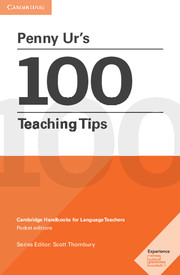Book contents
- Frontmatter
- Contents
- Why I Wrote this Book
- Beginning and Ending the Lesson
- The Coursebook
- Discipline
- Error Correction
- Games
- Grammar
- Group Work
- Heterogeneous (Mixed-Level) Classes
- Homework
- Interest
- Listening
- Pronunciation
- Reading Comprehension
- Speaking Activities
- Teacher Talk
- Testing and Assessment
- Vocabulary Teaching
- Writing
- P.S.
- Index
- Photo Acknowledgements
P.S.
Published online by Cambridge University Press: 17 November 2023
- Frontmatter
- Contents
- Why I Wrote this Book
- Beginning and Ending the Lesson
- The Coursebook
- Discipline
- Error Correction
- Games
- Grammar
- Group Work
- Heterogeneous (Mixed-Level) Classes
- Homework
- Interest
- Listening
- Pronunciation
- Reading Comprehension
- Speaking Activities
- Teacher Talk
- Testing and Assessment
- Vocabulary Teaching
- Writing
- P.S.
- Index
- Photo Acknowledgements
Summary
100 Do your own thing
To be really good at teaching you need to find your own teaching style and choose the methodology that suits you and your students.
Your main source of expertise has to be your own experience and experimenting – the more the better – supplemented by student feedback and discussion with colleagues or interaction with other teachers at conferences or online.
The next best source is the expertise of others, whether practitioners or academics, which you get through books and articles, websites (particularly blogs), conferences and in-service courses. The trouble is that there's an enormous amount of stuff out there. And there's no way any of us can gain access to all, or even most, of it, we’re too busy teaching. But do try to read, or hear, as much as you can. Conferences and teachers’ workshops, whether local or international, are particularly refreshing – and fun! – and a great place to get ideas from other professionals, or thought-provoking insights from the research.
And then rely on your own critical judgement as to which ideas from all this input are right for you. Don't let the ‘experts’ tell you what's best for your classroom: you’re the only one who knows. Listen to what they have to say, read what they have written, consider it carefully. And then decide for yourself whether you agree or not, and which of their ideas are right for you, will help your students learn better, and can contribute to your own expertise. (The same applies, of course, to the tips in this book.)
The first tip in this book was ‘start with a smile’. I hope that reading this last one will also leave you with a ‘smiley’ feeling! Because teaching should be fun and enjoyable for you as well as successful in terms of getting your students to learn English. And doing your own thing is the best way to achieve both.
- Type
- Chapter
- Information
- Penny Ur's 100 Teaching TipsCambridge Handbooks for Language Teachers, pp. 118Publisher: Cambridge University PressPrint publication year: 2016



